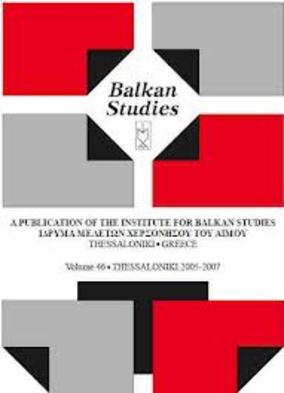An American ambassador at the court of St. Petersburg, Russia : Henry Middleton of South Carolina and John Capodistrias (1821-1827)
Part of : Balkan studies : biannual publication of the Institute for Balkan Studies ; Vol.39, No.1, 1998, pages 15-53
Issue:
Pages:
15-53
Section Title:
Articles
Author:
Abstract:
This study examines the last two years (1820-1822) of lohn Capodistriasat the Ministry of Foreign Affairs of Russia as reported by Henry Middleton,the United States Envoy Extraordinary and Minister Plenipotentiary (Ambassador)to Russia, in his diplomatic dispatches addressed to his government inWashington.The first part of the study deals with Middleton’s life and political careerin the State of South Carolina, following by his appointment to the Russiandiplomatic post by President James Monroe in 1820, serving in it until 1830.In St. Petersburg Middleton dealt in his diplomatic matters with Capodistriasand Count Karl Robert Nesselrode, the two secretaries who shared the affairsof the Russian Foreign Ministry.Middleton’s first two years at the Court of St. Petersburg coincided withCapodistrias’ last two years in the Russian diplomatic service. During thisperiod Middleton collaborated and worked closely with Capodistrias onseveral important questions dealing with Anglo-American and Russian-American relations, European diplomacy, the revolts in Western Europe, andthe Greek Revolution. His diplomatic dispatches provide new informationabout Capodistrias’ role in resolving crucial issues regarding the Anglo-American dispute stemming from the war of 1812 and the Treaty of Ghent,which ended that Anglo-American conflict, as well as the Russian-Americancontroversy over the Northwestern Coast of North America, an area under thejurisdiction of the Russian company, and in contention by the United States. Inaddition, Middleton’s dispatches provide a new and interesting information:Capodistrias, perhaps on his own initiative, made a proposal to the Americangovernment, through Middleton, its representative in St. Petersburg, for aRussian-American treaty of alliance in the summer of 1821 to counterbalancethe growing threat of England and Austria against Russia in the Near Easterncrisis. Such Russian-American alliance, Capodistrias believed, would indirectlyaid the Greek struggle of liberation from the Turks. But the Americangovernment refused to enter in a treaty with Russia and followed a Turkophilepolicy during and after the end of the Greek war of independence. In view ofthe vacillating attitude of Russia toward the Greek struggle of liberation,Capodistrias became disappointed with Emperor Alexander’s Near Easternpolicy and had no alternative but to resign from the Russian diplomaticservice. Capodistrias, however, worked at the Russian Ministry of ForeignAffairs almost to the last weeks before his departure for Western Europe onAugust 8/20 1822, as Middleton’s dispatches reveal.Finally, Middleton gives a few details about Capodistrias’ last visit to St.Petersburg in the spring of Î827 when he asked Emperor Nicholas for hisofficial resignation from the Russian service, as he was soon to assume theoffice of the presidency of Greece.
Subject:
Subject (LC):
Keywords:
John Capodistrias (1821-1827)




